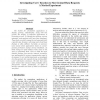Free Online Productivity Tools
i2Speak
i2Symbol
i2OCR
iTex2Img
iWeb2Print
iWeb2Shot
i2Type
iPdf2Split
iPdf2Merge
i2Bopomofo
i2Arabic
i2Style
i2Image
i2PDF
iLatex2Rtf
Sci2ools
HICSS
2016
IEEE
2016
IEEE
Investigating Users' Reaction to Fine-Grained Data Requests: A Market Experiment
The market for smartphone applications is steadily growing. Unfortunately, along with this growth, the number of malicious applications is increasing as well. To identify this malware, various automatic code-analysis tools have been developed. These tools are able to assess the risk associated with a specific app. However, informing users about these findings is often difficult. Currently, on Android, users decide about applications based on coarsegrained permission dialogs during installation. As alogs are quite abstract, many users do not read or understand them. Thus, to make the more detailed findings from security research accessible, new mechanisms for privacy communication need to be assessed. In our market experiment, we investigate how fine-grained data requests during runtime affect users’ information disclosure. We find that many users reverse their decision when prompted with a fine-grained request. Additionally, an effect of security awareness and level of detail on dis...
Biometrics | HICSS 2016 |
| Added | 03 Apr 2016 |
| Updated | 03 Apr 2016 |
| Type | Journal |
| Year | 2016 |
| Where | HICSS |
| Authors | Nicole Eling, Siegfried Rasthofer, Max Kolhagen, Eric Bodden, Peter Buxmann |
Comments (0)

